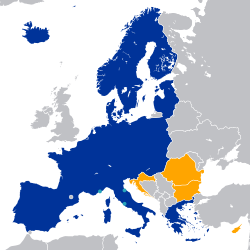BORDERING ON THE RIDICULOUS
The collapse of the Schengen zone and why it matters for Brexit

If the EU can break the rules for Germany and France, why not for Northern Ireland?
We bring a bright Brexit Facts4EU.Org light
onto the crumbling state of a central pillar of the EU
The EU takes Schengen very seriously. It has been a pillar of the EU since the zone's inception.
“The Schengen Area is one of the greatest achievements of the EU,”
the organisation says proudly.
Unfortunately, "Internal border controls to be prolonged," has been a regular refrain from the EU Commission for several years now. But what does this mean? And what relevance does it have to Brexit?
What is the Schengen agreement?
Schengen is ostensibly a border-free zone across EU Member States.
Currently the UK and Ireland are the only two countries to have opt-outs. Of the remaining 26 member states, 22 are full Schengen members, with Bulgaria, Croatia, Cyprus, and Romania being legally obliged to join the area when the EU says they can. In addition, the four EFTA states of Iceland, Liechtenstein, Norway, and Switzerland also participate in Schengen.
The Schengen code is a fundamental part of one of the EU’s “Four Freedoms”, as it involves free movement.

When the EU's gravy train hits the buffers of reality
There's just one problem. Some member states started breaking the Schengen zone from its early days. Many more did so by unilateral actions from 2015.
Twice in 2016 the EU Commission gave some of them formal permission (in retrospect) to do this.
Note, this permission was in retrospect. In other words, countries had already effectively torn up their treaty obligations with the EU, and yet the EU let them off and retrospectively granted permission.
In March 2016 the EU commission said that:
Schengen would be restored "as quickly as possible and with a clear target date of December 2016."
In Jan 2017, the EU Commission recommended to the EU Council that countries should continue to be allowed to break the Schengen code for another 3 months.
It's still broken today.
Schengen continues to be broken today
Fast-forwarding, it is now February 2019 and many countries continue to break the Schengen code with impunity.
Time and time again over the past few years we have reviewed yet another announcement from the EU Commission, saying that such and such a country has been granted permission to disobey the rules of the Schengen agreement. When we last reported on this, the latest announcement involved five member states and gave them each another three months extension. That was over a year ago.
There are now over 100 records of breaches of the Schengen code, with many involving multiple borders. Below are just six of the latest ones. We cite these from official EU records as usual, because then it gives Remoaners nowhere to go.
Please note that in many cases they affect multiple borders.
Austria
12/11/2018 - 11/05/2019
Security situation in Europe and threats resulting from the continuous significant secondary movements; land borders with Hungary and with Slovenia.
Norway (EEA & EFTA member and part of Schengen)
12/11/2018 - 11/05/2019
Security situation in Europe and threats resulting from the continuous significant secondary movements; all borders with an initial focus on ferry connections with Denmark, Germany and Sweden.
Sweden
12/11/2018 - 11/02/2019
Serious threat to public policy and internal security; all borders.
Denmark
12/11/2018 - 11/05/2019
Persistent and severe threat to public order and internal security; all borders with an initial focus on the land border with Germany and ports with connection to Germany.
Germany
12/11/2018 - 11/05/2019
Threats resulting from the continuous significant secondary movements; land border with Austria.
France
01/11/2018 -30/04/2019
Terrorist threats, situation at the external borders, upcoming high-level political meetings.
Observations
The EU’s idealistic Schengen rules have been destroyed by reality.
The effects of uncontrolled mass migration caused by Angela Merkel's government and the increased threat from home-grown terrorism has made Schengen virtually unworkable. When the EU refers to 'border controls' being extended, it means that the borders in question have had to revert to being normal, hard, international borders, and that Schengen has failed.
When the EU claims to be a ‘rules-based organisation’ it clearly isn’t. When the EU tells the UK it must obey the rules, why should it? No-one else does.
Anecdote – Gilets Jaunes assisting Brexit Facts4EU.Org
One of the intrepid Brexit Facts4EU.Org team was in pursuit of a story a few weeks ago. As part of her search for truth, at one point she had to cross the French border into Spain.
On that day, the ‘Gilets Jaunes’ had taken over the motorway border crossing. Flagged down by one of the yellow-jacketed protestors, he explained helpfully with a smile that they had taken over the toll booths and that she could pass without payment.
With a quick cry of “Liberté, Egalité, Fraternité!” to the Gilets Jaunes man, our intrepid reporter was on her way, tens of Euros better off.
04 Feb 2019
Sources: [ EU Commission ]
Since before the EU Referendum, Brexit Facts4EU.Org
has been the most prolific researcher and publisher of Brexit facts in the world.
Supported by MPs, MEPs, & other groups, our work has impact.
We think facts matter. Please donate today, so that we can continue to ensure a clean Brexit is finally delivered.
Paypal Users Only - Choose amount first
Quick One-off
Monthly


Something to say about this? Scroll down for reader comments